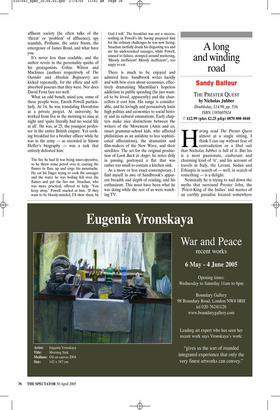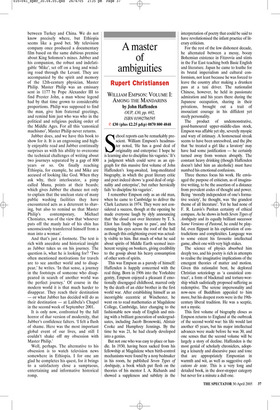A long and winding road
Sandy Balfour
THE PRESTER QUEST by Nicholas Jubber Doubleday, £14.99, pp. 516, ISBN 1385607024 ✆ £12.99 (plus £2.25 p&p) 0870 800 4848 Having read The Prester Quest almost at a single sitting, I think I can say without fear of contradiction or a libel suit that Nicholas Jubber is full of it. But his is a most passionate, exuberant and charming kind of ‘it’, and his account of travels in Italy, the Levant, Sudan and Ethiopia in search of — well, in search of something — is a delight.
Nominally he is trying to nail down the myths that surround Prester John, the ‘Priest-King of the Indies’ and master of an earthly paradise located somewhere between Turkey and China. We do not know precisely where, but Ethiopia seems like a good bet. My television company once produced a documentary film based on the same dubious premise about King Solomon’s mines. Jubber and his companion, the robust and indefatigable ‘Mike’, set off on a long and winding road through the Levant. They are accompanied by the spirit and memory of the 12th-century physician, Master Philip. Master Philip was an emissary sent in 1177 by Pope Alexander III to find Prester John, a man whose legend had by that time grown to considerable proportions. Philip was supposed to find the man, give him fraternal greetings, and remind him just who was who in the political and religious pecking order of the Middle Ages. For all this ‘canonical machismo’, Master Philip never returns.
Jubber does, and we have this book to show for it. It is an engrossing and highly enjoyable read and Jubber continually surprises us with his ability to overcome the technical challenges of writing about two journeys separated by a gap of 800 years or so. On finally reaching Ethiopia, for example, he and Mike are accused of looking like God. When they ask why, their interlocutor, a pimp called Muna, points at their beards; which gives Jubber the chance not only to explain that the unclean state of many public washing facilities they have encountered acts as a deterrent to shaving, but also to remind us that Master Philip’s contemporary, Michael Choniates, was of the view that ‘whoever puts off the manly hair of his chin has unconsciously transferred himself from a man into a woman’.
And that’s just a footnote. The text is rich with anecdote and historical insight as Jubber takes us on his journey. The question is, what he is looking for? ‘Two often mentioned motivations for travels are to see another world and to disappear,’ he writes. ‘In that sense, a journey in the footsteps of someone who disappeared in search of another world was the perfect journey.’ Of course in the modern world it is that much harder to disappear. They reach their destination — or what Jubber has decided will do as their destination — at Lalibela’s Chapel in the second week of September 2001.
It is only now, confronted by the full horror of that version of modernity, that Jubber’s confidence falters. ‘I felt a flush of shame. Here was the most important global event of our lives, and still I couldn’t shake off my obsession with Master Philip.’ Well, perhaps. The alternative to his obsession is to watch television news somewhere in Ethiopia. I for one am glad he completes his quest, for it brings to a satisfactory close a sumptuous, entertaining and informative historical romp.





















































 Previous page
Previous page